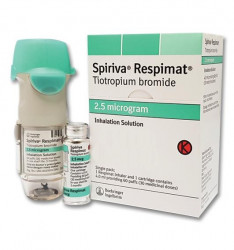Spiriva (tiotropium bromide) Coupons, Discounts & Cost
Spiriva (tiotropium bromide) is a drug for the treatment of bronchial asthma and obstructive bronchitis. One way to save money on the Spiriva retail cost regardless of income and insurance status is to use Spiriva coupons or discount cards from RXCoupons. Use this Tiotropium Bromide coupon at this online pharmacy and receive up to 75% off the sale price.
Spiriva pharmacological action
Spiriva (tiotropium bromide) is a drug for the treatment of bronchial asthma and obstructive bronchitis. This drug is available as capsules, including powder for inhalation.
Spiriva contains tiotropium bromide - this substance improves the process of relaxation in smooth muscle of the respiratory tract. Tiotropium bromide is a long-acting antimuscarinic and anticholinergic agent. The drug has a positive effect on patients with COPD. The bronchodilator effect is dose dependent. It lasts for at least 24 hours.
Spiriva indications
The drug is taken in the following cases: - Chronic bronchitis; - Emphysema; - COPD.
Spiriva dosage
Standard dose - 1 capsule 1 time per day. Do not swallow the powder. Capsules are used with the HandiHaler device.
How to use HandiHaler:
- Open the cap by pressing the button.
- Lift the cap and the mouthpiece.
- Take the capsule and place it in the inhaler.
- Close the mouthpiece.
- Place the inhaler in your mouth, hold the mouthpiece tightly. Take a slow breath to perform inhalation (to get the lung space completely filled).
- Hold your breath and take the inhaler out of your mouth.
- Repeat the inhalation until the capsule with the powder is empty.
- Open the mouthpiece and remove the capsule.
You will need to clean the inhaler once a month. To do this, rinse the cap, the mouthpiece, and the base of the device with warm water. The inhaler can be cleaned with a paper towel.
Do not use Spiriva inhalations if the capsule is damaged.
Spiriva side effects
Spiriva therapy may lead to unwanted side effects: - Dry mouth; - Bronchospasm; - Candidiasis of the oral mucosa; - Dysphonia; - Dizziness; - Tachycardia; - Dysphagia; - Hives; - Rash; - Constipation; - Cough; - Gastroesophageal reflux; - Supraventricular tachycardia; - Increased intracranial pressure; - Irritation of the pharynx; - Intestinal obstruction; - Anaphylaxis; - Nasal bleeding; - Atrial fibrillation; - Urinary tract infections; - Blurred vision; - Angioedema; - Glaucoma.
Digestive disorders: dry mouth, stomatitis, constipation, gastroesophageal reflux; rarely - gingivitis, glossitis, intestinal obstruction, dysphagia.
Respiratory tract: dysphonia, cough, pharyngitis; rarely - paradoxical bronchospasm, laryngitis, sinusitis, nosebleeds.
Cardiovascular system: atrial fibrillation; rarely - tachycardia, palpitations.
Kidneys and urinary tract: delayed urination (in men), dysuria; rarely - urinary tract infections.
Allergic reactions: rash; rarely - hives, itching, hypersensitivity reactions, angioedema.
Musculoskeletal system: swelling of the joints.
CNS: dizziness; rarely - insomnia.
Spiriva contraindications
Spiriva is not prescribed for pregnant women (I trimester) and children. Do not use in case of hypersensitivity to the components of the drug.
The drug is used with caution in case of angle-closure glaucoma, bladder neck obstruction, hyperplasia of the prostate, kidney failure.
The drug should not be used in the first trimester of pregnancy.
Spiriva interactions
It is not recommended to combine anticholinergic drugs and Spiriva.
It is possible to perform inhalations with other drugs used for COPD therapy (methylxanthines, sympathomimetics, inhaled or oral steroids).
Spiriva overdose
Spiriva overdose symptoms may be accompanied by dry mouth, tachycardia, bilateral conjunctivitis.
Additional information
Acute bronchospasm attacks are not treated with Spiriva.
Spiriva inhalations may lead to anaphylaxis, reflex bronchospasm.
Avoid contact with the eyes. Spiriva inhalation powder may cause pain, discomfort, blurred vision. You should consult an ophthalmologist in this case.
The drug may also cause dizziness. Therefore, you should practice safe driving.
Elderly patients may use standard doses. Patients with hepatic pathologies may use standard doses as well. It is advisable to undergo a regular examination of kidney function in case of kidney disease.

